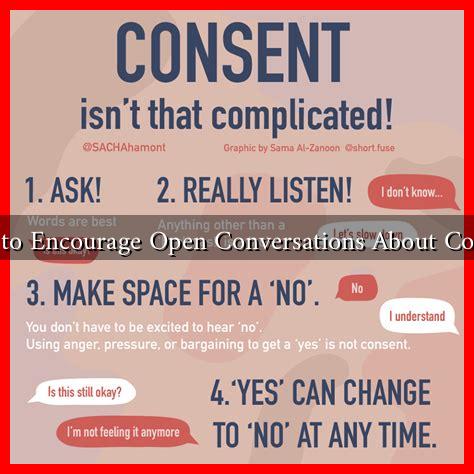-
Table of Contents
How to Encourage Open Conversations About Consent
In recent years, the conversation surrounding consent has gained significant traction, yet many individuals still find it challenging to discuss openly. Consent is not merely a legal term; it is a fundamental aspect of healthy relationships and personal autonomy. Encouraging open conversations about consent can empower individuals, foster mutual respect, and create safer environments. This article explores effective strategies to promote these essential discussions.
The Importance of Consent Education
Understanding consent is crucial for everyone, regardless of age or background. Consent education helps individuals recognize their rights and responsibilities in interpersonal relationships. Here are some key reasons why consent education is vital:
- Empowerment: Knowledge about consent empowers individuals to express their boundaries clearly.
- Prevention of Misunderstandings: Open discussions can help clarify what consent looks like, reducing the risk of miscommunication.
- Reduction of Sexual Violence: Studies show that comprehensive consent education can lead to a decrease in sexual assault incidents.
Creating Safe Spaces for Discussion
To encourage open conversations about consent, it is essential to create safe and non-judgmental environments. Here are some strategies to foster such spaces:
- Establish Ground Rules: Set clear guidelines for discussions, emphasizing respect and confidentiality.
- Use Inclusive Language: Ensure that the language used is inclusive and sensitive to diverse experiences and identities.
- Encourage Active Listening: Promote active listening skills to ensure everyone feels heard and valued.
Incorporating Consent into Everyday Conversations
Integrating discussions about consent into everyday conversations can normalize the topic. Here are some practical ways to do this:
- Use Media as a Tool: Discuss movies, TV shows, or news articles that depict consent issues. This can serve as a springboard for deeper conversations.
- Share Personal Experiences: Encourage individuals to share their experiences related to consent, fostering a sense of community and understanding.
- Ask Open-Ended Questions: Pose questions that invite reflection, such as “What does consent mean to you?” or “How can we ensure everyone feels comfortable expressing their boundaries?”
Utilizing Educational Resources
Many organizations provide valuable resources for consent education. Utilizing these materials can enhance understanding and facilitate discussions. Some notable resources include:
- RAINN (Rape, Abuse & Incest National Network): Offers comprehensive information on consent and sexual violence prevention.
- Planned Parenthood: Provides educational materials on consent tailored for teens.
- Love Is Respect: Focuses on healthy relationships and includes resources on consent.
Engaging in Role-Playing Scenarios
Role-playing can be an effective method to practice conversations about consent. This technique allows individuals to explore different scenarios in a safe environment. Here’s how to implement role-playing:
- Choose Scenarios: Select realistic situations that may arise in relationships, such as asking for consent in various contexts.
- Encourage Empathy: Participants should consider both perspectives—those giving and receiving consent.
- Debrief After Role-Playing: Discuss what was learned from the exercise and how it can be applied in real-life situations.
Conclusion
Encouraging open conversations about consent is essential for fostering healthy relationships and preventing sexual violence. By creating safe spaces, incorporating consent into everyday discussions, utilizing educational resources, and engaging in role-playing scenarios, we can promote a culture of respect and understanding. As we continue to advocate for consent education, we empower individuals to express their boundaries confidently and engage in meaningful dialogues. Together, we can create a society where consent is not just a legal requirement but a fundamental aspect of human interaction.


